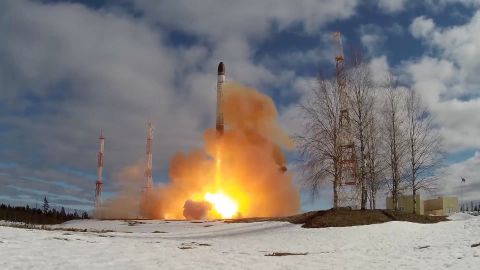
CNN
—
Russia carried out a test of an intercontinental ballistic missile that appears to have failed around the time President Joe Biden was in Ukraine on Monday, according to two US officials familiar with the matter.
Russia notified the United States in advance of the launch through deconfliction lines, one official said. Another official said that the test did not pose a risk to the United States and that the US did not view the test as an anomaly or an escalation.
The test of the heavy SARMAT missile – nicknamed the Satan II in the West and capable of delivering multiple nuclear warheads – appears to have failed, officials said. It has been successfully tested before and had this one worked, US officials believe Russian President Vladimir Putin would have highlighted the test in his State of the Nation address on Tuesday.
Instead, Putin made no mention of the launch in the speech that lasted an hour and 45 minutes. He did, however, formally declare that Russia will be suspending his country’s participation in the New START nuclear arms reduction treaty with the United States, imperiling the last remaining pact that regulates the world’s two largest nuclear arsenals.
CNN initially reported the apparent test occurred while Biden was in Ukraine based off information from sources. After this story first published, one of the officials said the test occurred just before Biden was in the country. The second source had told CNN that the test was on Monday without providing any more specific timing.
The timing of the test suggests that the US and Russia were communicating through several different channels earlier this week for deconfliction purposes – US officials also notified the Russians on Sunday night, hours before Biden’s visit to Kyiv, that the president would be making the trip to the Ukrainian capital, national security adviser Jake Sullivan said on Monday.
CNN has asked Russia’s embassy in Washington for comment.
Putin has announced successful ICBM tests in the past, including last April, just months after Russia invaded Ukraine. That test was also for the SARMAT missile which was first unveiled in 2016 and said by Russian state media to have a range exceeding 11,000 kilometers (6,835 miles). The missile can carry a warhead weighing 100 tons and was designed as a successor to the R-36M Voevoda ICBM.

Putin warned last year that the missile would “give thought to those who are trying to threaten Russia.”
At the time, Western experts portrayed the 2022 test as “nuclear saber-rattling” and it was perceived as an attempt to distract from Russia’s military failures at the time, such as the sinking of its Black Sea flagship the Moskva.
Then-Pentagon press secretary John Kirby called the 2022 test “routine, and it was not a surprise. It was not deemed to be a threat to the United States or its allies.”
The Russian military has faced multiple major defeats on the battlefield in Ukraine over the last year and has broadly “failed” in its strategic objectives there, multiple senior US officials have said.
“Russia is now a global pariah and the world remains inspired by Ukrainian bravery and resilience. In short, Russia has lost – they’ve lost strategically, operationally, and tactically,” Chairman of the Joint Chiefs of Staff Gen. Mark Milley said last week.
Yet Putin has shown no intention of rethinking his war, which he still insists is a “special military operation.”
Last week, Russian fighters and bombers flew near Alaska two times in as many days, forcing NORAD to scramble its fighter jets in response. The Russian aircraft remained outside US and Canadian sovereign airspace, which extends 12 miles from the coastline, but they flew in or near Alaska’s Air Defense Identification Zone, which is up to 200 miles from the coastline.
Two NORAD F-16s intercepted TU-95 bombers and SU-35 fighters that had already entered the ADIZ last Monday. One day later, NORAD F-35s intercepted TU-95 bombers, as well as SU-30 and SU-35 fighters.
“We remain ready to employ a number of response options in defense of North America and Arctic sovereignty,” NORAD said in a statement.
NORAD stressed that it did not view the Russian flights as provocative or as a threat, nor did it consider it related to the aerial objects seen around Alaska and Canada recently.
CORRECTION: This story has been updated to better reflect the timing of the apparent failed intercontinental ballistic missile test.
